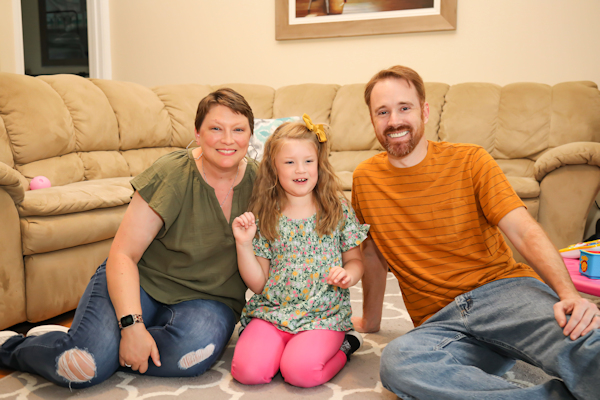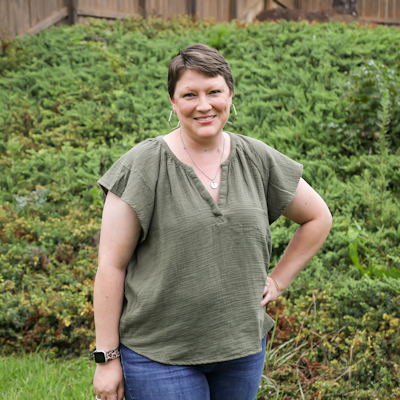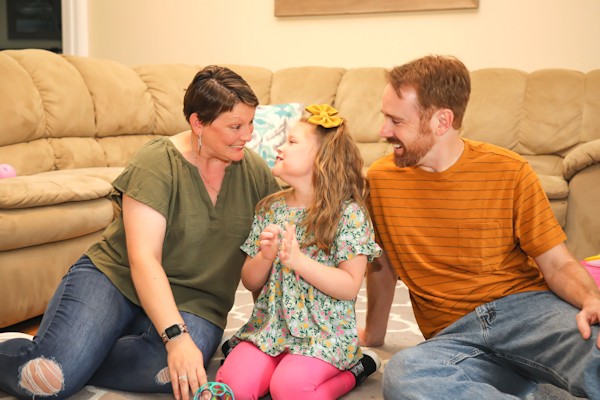Brandee Menick has been advocating for her daughter, Agatha, since the day she was born.
When Menick and her husband, Ronald, found out their daughter had special needs, they quickly realized that they would have to be Agatha’s biggest advocates if they wanted her to have the best life possible.
 Since then, the Villa Rica mom has been fighting for her daughter’s rights when it comes to education, health care and just everyday life. Now, Menick is fighting for herself.
Since then, the Villa Rica mom has been fighting for her daughter’s rights when it comes to education, health care and just everyday life. Now, Menick is fighting for herself.
After years of being her daughter’s main advocate, Menick was diagnosed with breast cancer at 39.
Life before cancer
Originally from Minnesota, Menick moved to Villa Rica in 2007 after graduating from college, where she earned a bachelor’s to become a paralegal.
“My parents moved down here first, and half of us kids followed within a couple of years,” she said.
The following year, she met Ronald. They got engaged in 2011 and tied the knot in 2013.
Not long after, they were told by their doctor that they couldn’t have children. So, they were surprised when Menick became pregnant in 2015.
She gave birth to Agatha in May 2016 — 10 weeks early. When Agatha was about a year old, the Menicks realized something was wrong.
In search of answers, the Menicks took Agatha to a doctor who diagnosed her with cerebral palsy. As Agatha got older, Menick realized her career as a paralegal wouldn’t be flexible enough to accommodate Agatha’s needs. When Agatha was around 3, Menick quit her job to stay home.
“It was life-changing because I went to school and got a bachelor’s degree as a paralegal,” she said. “That was something I strived for and focused on, so that was a little difficult to give up. But it was obviously for the better.”
A life-changing diagnosis
In February 2020, she learned her 50-year-old brother, Jake, was diagnosed with non-Hodgkin’s lymphoma. Just a few months later, he passed away.
Menick always went to her annual checkup, and when she was 38, her doctor recommended a mammogram.
Because her grandmother had breast cancer, Menick was at a higher risk. Since Menick was under 40 (the recommended age to start getting mammograms), she had to call her insurance company to see if they would cover it.
“I blew it off,” she admitted.
The following year, Menick noticed changes in her breast that prompted her to schedule an appointment with her primary care doctor.
On June 23, 2021, Menick went to the appointment where her doctor ordered a diagnostic mammogram. She was able to get a screening the following morning because they had an opening.
After the screening, the radiologist spotted something suspicious, and she was scheduled with Raul Zunzunegui, MD — also known as “Dr. Z” by his patients — a breast surgeon with Tanner’s Comprehensive Breast Care Center.
Dr. Z performed a stereotactic biopsy, and the results showed that Menick had a hormone receptor-negative cancer that was also HER2 positive.
“For some women diagnosed with more aggressive types of breast cancer, like HER2 positive, it’s important that they receive treatment as soon as possible," Dr. Z said. "The earlier the treatment starts, the higher the chance for survival. That's why our team works to get our patients a treatment plan in place within three days of diagnosis."
When Dr. Z called to tell her the news on July 1, it was around lunchtime, and she was at Chuck E. Cheese. The news was devastating, especially considering that her older brother had recently passed away from cancer.
“It was very scary, and there were a lot of tears,” she said. “But I’m the type that when I receive that kind of information, I’m going to determine a plan on how to execute it, fight it and get through it.”
The journey begins
Menick’s treatment plan included chemotherapy, a mastectomy with sentinel node biopsy followed by immediate reconstruction and post-mastectomy radiation.
“The chemo came first because they wanted to see how well it worked,” she said. “I had one mass and one lymph node that was positive.”
 On July 17, 2021, Menick had a port put in so she could begin chemotherapy. She had her first treatment on July 23, 2021, which was neoadjuvant chemotherapy with Herceptin, an effective treatment for early-stage breast cancer.
On July 17, 2021, Menick had a port put in so she could begin chemotherapy. She had her first treatment on July 23, 2021, which was neoadjuvant chemotherapy with Herceptin, an effective treatment for early-stage breast cancer.
“You receive two different chemotherapies and two different antibody therapies (Herceptin and Perjeta),” she said. “The first round was pretty awful, but my doctors and I figured out a way to make it more tolerable as we progressed.”
When surgeons performed the mastectomy, they found residual cancer, which required treatment with Kadcyla.
After surgery, the lymph nodes tested negative.
“The mass pretty much went away except about 11 millimeters, so it’s like half a fingernail,” she said. “Once the Kadcyla is done, then I’ll be able to have the rest of my reconstruction.”
The side effects of chemotherapy made her feel like she had the flu every three weeks.
“Your body aches, and when you have a special needs child who doesn’t walk, lifting her and moving her around was complicated,” she said. “I’m glad I’m through it.”
While she lost her hair while undergoing treatment, it didn’t bother her much. In fact, she cut her hair extra short before losing it.
And once it happened, her beautician shaved it off.
“I'm not that much of a girly girl, so not doing my hair was great," she said. "I wore a baseball hat the whole time rather than having to explain it to people."
She also lost about 20 pounds. While her experience with undergoing chemotherapy was less than stellar, the most difficult part of the treatment was getting used to the way food tasted.
"Food was probably the biggest thing because I like to eat and enjoy my food,” she said. “I would have my infusions on Fridays, and I would start feeling awful that next Tuesday. Things would taste like ashes for about a week."
Foods that helped mask the taste were vinegar-based foods like pickles and mustard, which were more tart. Menick also drank a lot of water to stay hydrated.
With all she's gone through, Menick was happy to learn through genetic testing that she doesn't have any genetic mutations that would predispose her for breast cancer.
"So, my daughter is OK," she said.
Comprehensive and compassionate care
While undergoing treatment, Menick's healthcare team at Tanner Cancer Care was there every step of the way.
"Nicolle (Rooks, RN) has been absolutely amazing," she said. "I'm an overthinker. I'm an over-planner. So anytime I had some crazy question, I would email her, and she would calm me down off the ledge or tell me to stop Googling."
Her healthcare team includes Dr. Z., plastic surgeon Stephen Kahler, MD, medical oncologist Yuesheng Qu, MD, and radiation oncologist Jason Sanders, MD.
"Dr. Kahler is awesome and we understand each other," she said. "Dr. Qu is very matter-of-fact, which I respond well to."
She also appreciated Dr. Z's willingness to reach out to her and answer any questions she had.
“He'd get on the phone and call me," she said. "There was even a day when he called me on the weekend, so if there's anything that he needed to tell me, he would call, and you don't get that from a lot of doctors."
Support through the journey
Menick's daily routine didn't change much.
If she wasn't feeling well, her husband would step in.
"The pandemic was a little bit of a blessing because he worked from home," she said. "If I couldn't function, he would give me a break. If I was feeling bad enough or had a doctor's appointment, we worked around it."
Menick's in-laws were also a part of her support system.
"My father-in-law is like my daughter's BFF, and he'll step in when he needs to," she said. "He took me to a few of my treatments, so family really stepped in along with a few close friends."
She also has a close friend, Joyce, who she calls her "work mom," who went along to most of her treatments. Her best friend Stacia also went to a few of her treatments.
"It was very much a village," she said.
Menick also has family and friends back in Minnesota who supported her from afar.
"My sister and a couple of my friends set up a support group on Facebook and made T-shirts," she said. "My treatment was every three weeks on Fridays, so they would wear pink on those days and post them all over the Facebook group."
They also hosted a couple of fundraisers. Even Agatha, who doesn't know exactly what's going on with her mother, was there to support her.
"She's non-verbal and can't really express herself, but there have been times where she wants to cuddle, or she'll grab my face and just look at me," she said. "I think cognitively, she understands or at least knows I'm not feeling good, and she'll give me a break."
Menick feels her diagnosis has only strengthened their bond.
"I'm doing a lot of my fighting for her," she said.
An advocate for life
 Now 40, Menick continues to advocate for her daughter while advocating for herself.
Now 40, Menick continues to advocate for her daughter while advocating for herself.
She admits she didn't do a lot of self-care before her diagnosis.
"Having to focus on myself has helped me grow as a person — to listen to my body and know if I'm tired, not to try to do all the things all the time," she said. "It's OK to take a break and realize that you need to slow down a little bit."
She also admits that this is something she isn't good at.
"But once you do it a few times, you kind of get used to it, or you're at least not afraid to ask for help," she said.
Menick is now using her experience as an advocate to help others facing a cancer diagnosis. She is sharing her story in the hopes that it will help others facing a similar situation.
"I want people to know they're not alone," she said. "There is help out there and there are people who understand what you're going through."
She also stressed the importance of taking care of your mental health and noted that she sees a therapist every month.
"The mental stuff, I think, is No.1," she said. "What helps is staying positive, keeping myself busy and not trying to change my routine too much — to keep things normal."
She also does stretching exercises and yoga every day, which has helped improve her mental health immensely.
If you or someone you know has been diagnosed with cancer, resources are available to help. Visit TannerBreastHealth.org for more information.